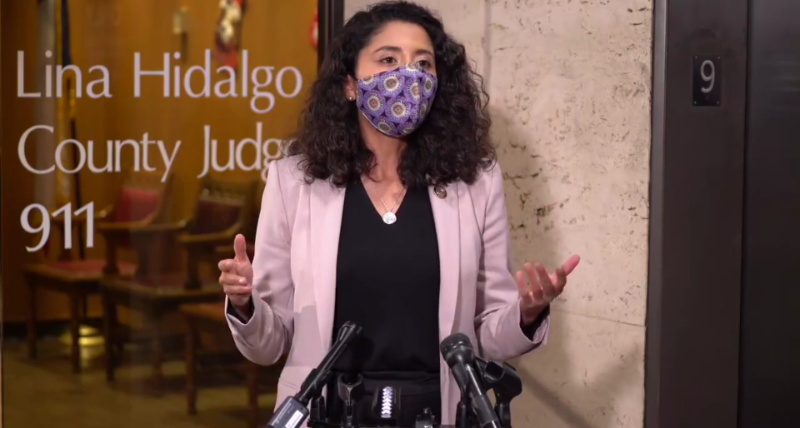In a Tuesday afternoon press conference, Harris County Judge Lina Hidalgo said that she expected that Harris and surrounding counties would likely have to start reimplementing occupancy restrictions for local businesses and halt non-essential elective surgical procedures, all thanks to Gov. Greg Abbott’s statewide order that tied reopenings to COVID-19 hospitalizations.
“Unless things change in the next few hours, unless there’s a 180-degree shift, we do sadly expect to cross that threshold, to cross that 15 percent for seven days, and to join the other regions that are now in a situation where they’re having to roll back the reopening,” Hidalgo said earlier on Tuesday.
Shortly after Hidalgo’s remarks, the Department of State Health Services confirmed on its website that Harris County’s Trauma Service Area Q — which also includes Fort Bend, Montgomery, Austin, Colorado, Matagorda, Walker, Waller and Wharton counties — has had 15 percent of its hospital beds occupied by coronavirus patients for seven straight days, which Abbott had declared the threshold for rolling back business reopenings.
Hidalgo then confirmed via Twitter that "The Harris County region officially crossed the state's hospitalization threshold triggering #COVID19 reopening rollbacks."
"Honestly," her tweet continued, "this is just another milestone on the road to a catastrophe unless each of us acts."
Fifteen of Texas’s other 21 Trauma Service Areas had met that troubling threshold as of Tuesday.
Per Abbott’s Executive Order GA-32, local businesses currently allowed to be open at 75 percent capacity — restaurants, all retail stores, office buildings, manufacturing businesses, museums, libraries and gyms — would now have to limit occupancy to 50 percent.
In counties like Fort Bend and Montgomery where local officials let bars reopen as allowed by Abbott, bars will now have to shut down. But bars that started selling food to reclassify as “restaurants” thanks to a Texas Alcoholic Beverage Commission loophole will only have to reduce occupancy to 50 percent. Local hospitals will also be required to halt “non-essential medical surgeries” according to Abbott’s reopening order.
Earlier this week, Texas Medical Center member hospitals started discussing plans to limit some non-essential medical procedures to preserve resources for the rising numbers of local coronavirus patients, but now that the Harris County region has hit the 15 percent threshold, those voluntary surgery limits will become mandatory.
Abbott’s executive order only refers to “non-essential medical surgeries” as being tied to local coronavirus hospitalizations, and a spokesman for Hidalgo’s office wasn’t sure on Tuesday afternoon whether or not it would affect outpatient procedures already scheduled by local providers.
These new state-mandated rollbacks will only be reversed once the local Trauma Service Area reports coronavirus hospitalizations under 15 percent for seven straight days, Abbott’s order dictates.
Hidalgo said that while she was glad Abbott was using a firm metric like hospitalizations to determine how open Texan businesses can be, she was still skeptical that the new rollbacks would do enough to halt the worsening spread of the coronavirus.
Other parts of the state like the hard-hit El Paso area, Hidalgo said, still saw their situations worsen dramatically even in the weeks after that area limited business capacity and halted elective surgeries.
“El Paso, for example, reached their threshold before they found themselves overwhelmed, and so reaching the threshold [and] activating the rollback doesn’t in and of itself change the trajectory,” Hidalgo said. “That’s something that’s in all of our hands.”
“This is a wake-up call for us,” Hidalgo continued. “This is the last wake-up call we might get.”
Support Us
Houston's independent source of
local news and culture
account
- Welcome,
Insider - Login
- My Account
- My Newsletters
- Contribute
- Contact Us
COVID Hospitalizations Surge and Houston Area Heads For a Rollback

Screenshot
Harris County Judge Lina Hidalgo on Tuesday said that Harris County businesses would likely have to limit occupancy again soon.
[
{
"name": "Related Stories / Support Us Combo",
"component": "11591218",
"insertPoint": "4",
"requiredCountToDisplay": "4"
},{
"name": "Air - Billboard - Inline Content",
"component": "11591214",
"insertPoint": "2/3",
"requiredCountToDisplay": "7"
},{
"name": "R1 - Beta - Mobile Only",
"component": "12287027",
"insertPoint": "8",
"requiredCountToDisplay": "8"
},{
"name": "Air - MediumRectangle - Inline Content - Mobile Display Size 2",
"component": "11591215",
"insertPoint": "12",
"requiredCountToDisplay": "12"
},{
"name": "Air - MediumRectangle - Inline Content - Mobile Display Size 2",
"component": "11591215",
"insertPoint": "4th",
"startingPoint": "16",
"requiredCountToDisplay": "12"
}
]

